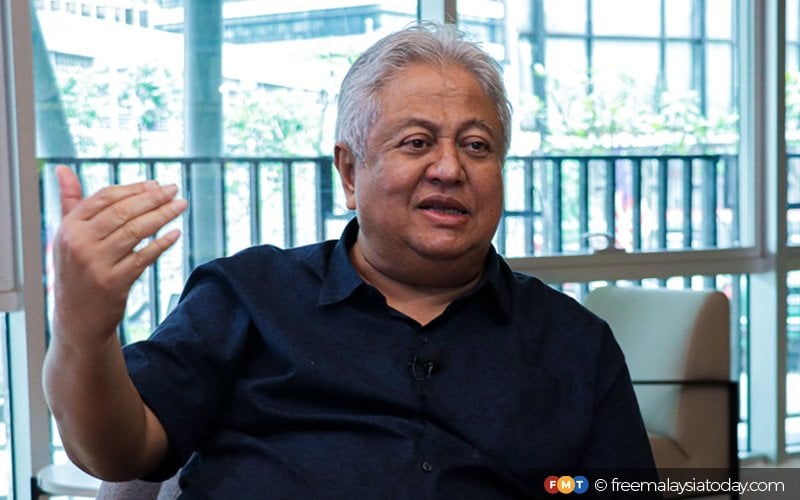FMT:
Zaid hails lawyer’s ‘courage’ after successful constitutional challenge
The former law minister also tells Bersatu and PAS not to ‘play politics with religion’.

Former law minister Zaid Ibrahim has praised lawyer Nik Elin Zurina Nik Abdul Rashid for her courage in standing by the laws of the land.
PETALING JAYA: Former law minister Zaid Ibrahim has praised lawyer Nik Elin Zurina Nik Abdul Rashid for her courage after her successful petition to strike down various provisions in a Kelantan state shariah enactment.
PETALING JAYA: Former law minister Zaid Ibrahim has praised lawyer Nik Elin Zurina Nik Abdul Rashid for her courage after her successful petition to strike down various provisions in a Kelantan state shariah enactment.

Nik Elin Zurina Nik Abdul Rashid.
In 2022, Nik Elin Zurina and her daughter, Tengku Yasmin Nastasha Tengku Abdul Rahman, filed a petition challenging the constitutionality of 18 provisions in Kelantan’s Syariah Criminal Code (I) Enactment 2019.
In an 8-1 ruling today, the Federal Court struck down 16 provisions in the enactment on the grounds that they violated the Federal Constitution.
Chief Justice Tengku Maimun Tuan Mat said the Kelantan assembly had no power to enact the 16 provisions as part of its enactment as the offences were already covered under federal laws.
In a post on X, Zaid related how his own bid to challenge shariah laws, which Kelantan enacted in the 1990s, reached a dead end due to political pressure.
“Congratulations Nik Elin Zurina for your courage to stand by the laws of the land. You have succeeded (in doing) what I could not do 30 years ago,” he said.
Zaid said that after political Islam started gaining ground in Malaysia in the 1980s, the easiest way for politicians to gain support had been to claim that the legal system was flawed as it was “unIslamic”.
He said while certain parliamentarians swore to defend the Federal Constitution when reciting their oath of office, they would promise to introduce a legal system that was “fully shariah” when campaigning for votes.
The former Kota Bharu MP said state assemblies under these politicians’ control then started passing criminal laws that they considered to be Islamic, even though most of them were already in place in the Penal Code.
“In 1993, Kelantan passed what was described as ‘hudud law’, where punishment for theft and robbery is the amputation of limbs,” said Zaid.
“I challenged the law as unconstitutional as the power to legislate criminal laws is vested with Parliament.
“Leave was obtained for the issue to be decided by the Federal Court, but political pressure was brought to bear on me to withdraw the case.
“I was told it might cause Barisan Nasional’s defeat.”
‘No need to play politics with religion’
Today’s ruling has been criticised by PAS and Bersatu, both of which claimed that it will threaten shariah laws in other states and affect the status of Islamic law in Malaysia.
In response, Zaid told the two opposition parties that Islam’s position was already secure in Malaysia.
“The country’s legal system has provided enough avenues for Islamic law to be practised and the shariah courts have enough power to do justice,” he said.
“There is no need to play politics with religion.
“Serve the Muslims well; take care of their present hardships; make the current system more efficient.
“There is no need to violate and infringe on our constitution and destroy the framework our leaders had worked hard to establish in 1957 and 1963 through overzealous demands for an Islamic system.
“Work with what we have, and accept that we are a democracy.”
In 2022, Nik Elin Zurina and her daughter, Tengku Yasmin Nastasha Tengku Abdul Rahman, filed a petition challenging the constitutionality of 18 provisions in Kelantan’s Syariah Criminal Code (I) Enactment 2019.
In an 8-1 ruling today, the Federal Court struck down 16 provisions in the enactment on the grounds that they violated the Federal Constitution.
Chief Justice Tengku Maimun Tuan Mat said the Kelantan assembly had no power to enact the 16 provisions as part of its enactment as the offences were already covered under federal laws.
In a post on X, Zaid related how his own bid to challenge shariah laws, which Kelantan enacted in the 1990s, reached a dead end due to political pressure.
“Congratulations Nik Elin Zurina for your courage to stand by the laws of the land. You have succeeded (in doing) what I could not do 30 years ago,” he said.
Zaid said that after political Islam started gaining ground in Malaysia in the 1980s, the easiest way for politicians to gain support had been to claim that the legal system was flawed as it was “unIslamic”.
He said while certain parliamentarians swore to defend the Federal Constitution when reciting their oath of office, they would promise to introduce a legal system that was “fully shariah” when campaigning for votes.
The former Kota Bharu MP said state assemblies under these politicians’ control then started passing criminal laws that they considered to be Islamic, even though most of them were already in place in the Penal Code.
“In 1993, Kelantan passed what was described as ‘hudud law’, where punishment for theft and robbery is the amputation of limbs,” said Zaid.
“I challenged the law as unconstitutional as the power to legislate criminal laws is vested with Parliament.
“Leave was obtained for the issue to be decided by the Federal Court, but political pressure was brought to bear on me to withdraw the case.
“I was told it might cause Barisan Nasional’s defeat.”
‘No need to play politics with religion’
Today’s ruling has been criticised by PAS and Bersatu, both of which claimed that it will threaten shariah laws in other states and affect the status of Islamic law in Malaysia.
In response, Zaid told the two opposition parties that Islam’s position was already secure in Malaysia.
“The country’s legal system has provided enough avenues for Islamic law to be practised and the shariah courts have enough power to do justice,” he said.
“There is no need to play politics with religion.
“Serve the Muslims well; take care of their present hardships; make the current system more efficient.
“There is no need to violate and infringe on our constitution and destroy the framework our leaders had worked hard to establish in 1957 and 1963 through overzealous demands for an Islamic system.
“Work with what we have, and accept that we are a democracy.”
No comments:
Post a Comment